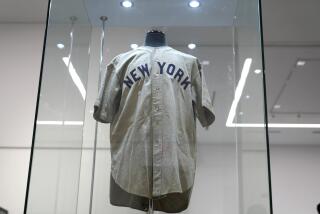Court Rules Ruth Name Is Private, Image Is Not
Book publishers and baseball memorabilia collectors have scored a major victory in a court case about who can publish photographs of Babe Ruth.
New York federal appeals court ruled Monday that, although the Babeâs heirs own his name, they do not own his image.
The ruling stemmed from a lawsuit filed against Macmillan Inc. by Ruthâs daughters, Dorothy Ruth Pirone and Julia Ruth Stevens, claiming that Macmillan had illegally used three photographs of Ruth in a 1988 baseball trivia calendar.
Judge Irving R. Kaufman wrote in his opinion: âRuth was one of the most photographed men of his generation, a larger-than-life hero to millions and a historical figure in whom interest still runs high.â
While Ruth lived, the judge wrote, he was paid by various manufacturers for the use of his picture or name in promoting the sale of various products. After Ruthâs death in 1948, his daughters registered the words Babe Ruth as a trademark for âpaper articles, namely playing cards, writing paper and envelopes,â Kaufman wrote.
That trademark has been lucrative. Mark Roesler, president of Curtis Management Group, the Babeâs Indianapolis-based licensing agent, said last December that fees paid to the Ruth family were estimated at $400,000 for 1989 and were expected to grow to $1 million in 1990.
The photographs at issue in the case appeared in the 1988 Macmillan Baseball Engagement Calendar. The words Babe Ruth are not on the calendar cover, the judge noted.
The calendar cover has a photo of Ruth helping a small boy with his batting grip. Inside the calendar, there is a photo of the Babe saluting Gen. John Pershing and a photo of a baseball autographed by Ruth.
Ruthâs daughters objected to the use of Ruthâs likeness. Their suit alleged federal and common-law trademark infringement and unfair competition, infringement of the common law right of publicity and violation of the New York Civil Rights Law. The New York law forbids the use for advertising or trade purposes of any portrait or picture without the consent of the subject if the subject is living.
Judge Kaufman acknowledged that there is a valuable commodity in a public figureâs image, but he said that Ruthâs daughters had made much too broad a claim.
More to Read
Inside the business of entertainment
The Wide Shot brings you news, analysis and insights on everything from streaming wars to production â and what it all means for the future.
You may occasionally receive promotional content from the Los Angeles Times.










